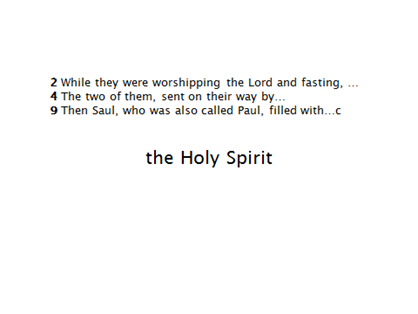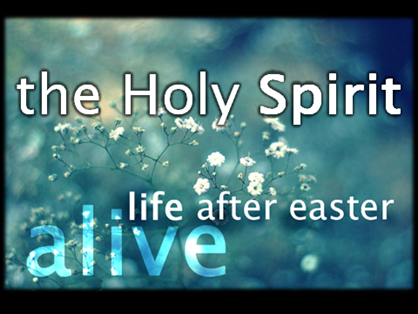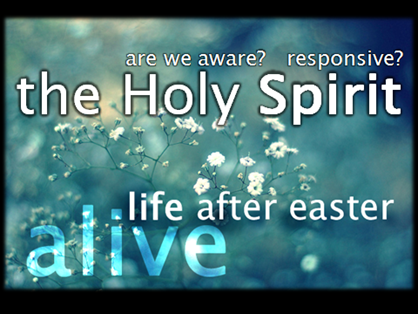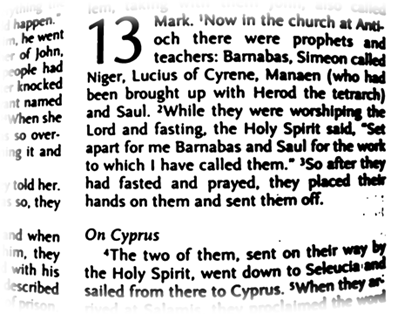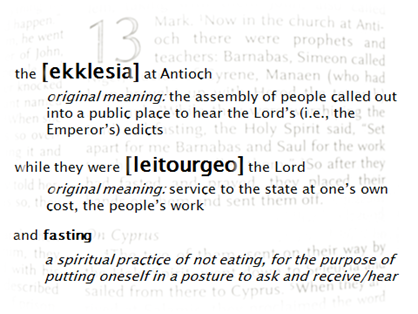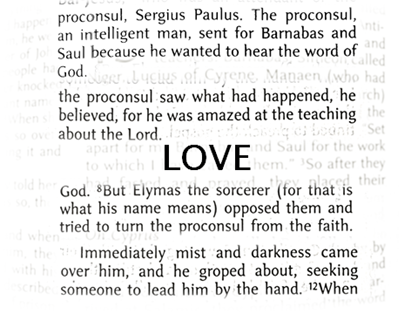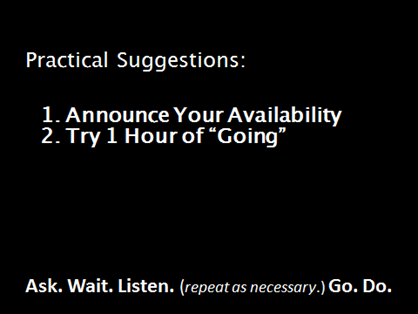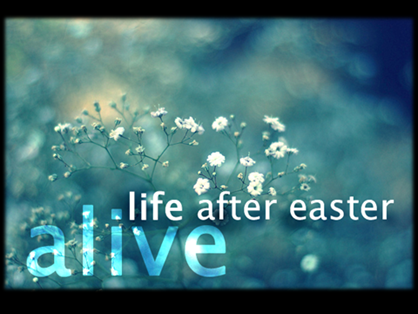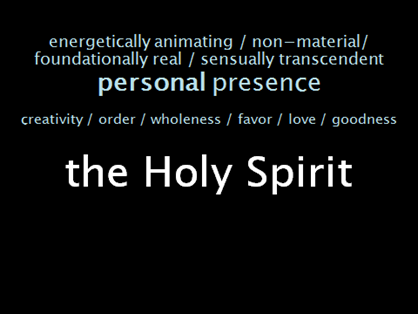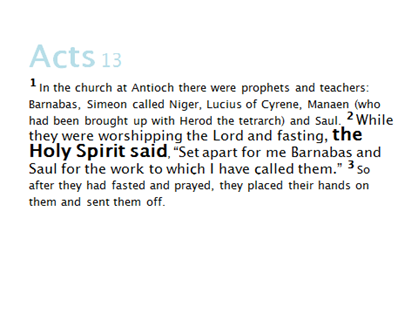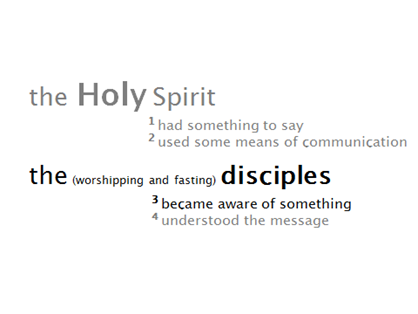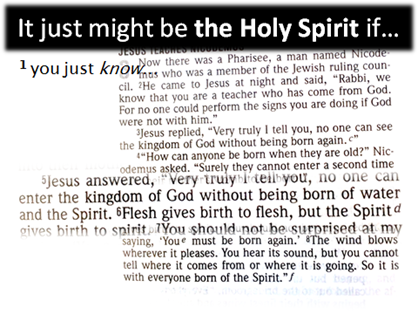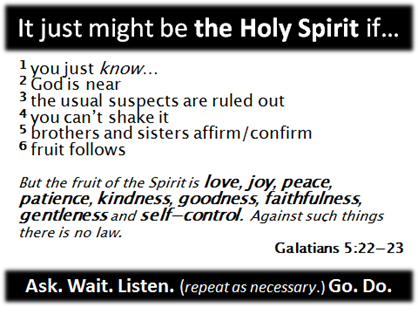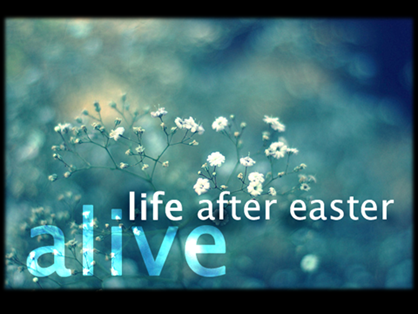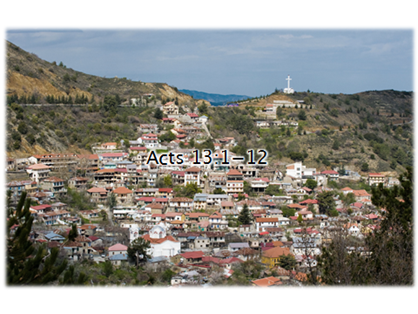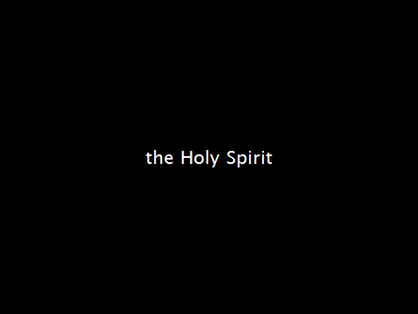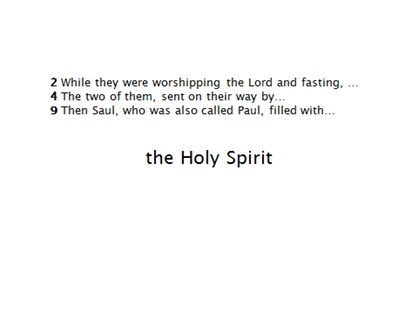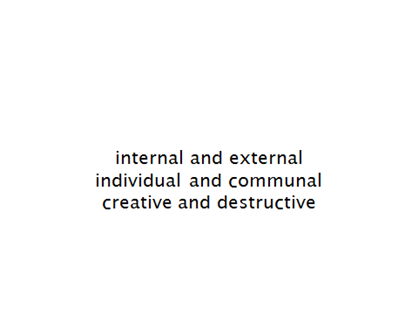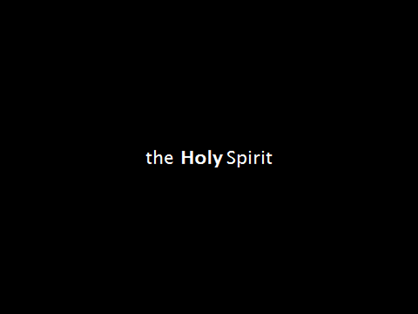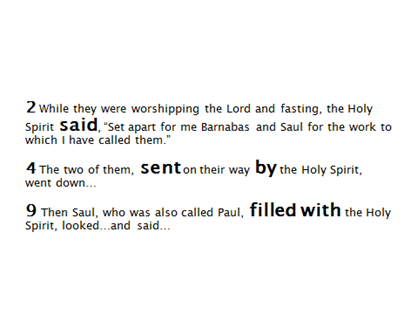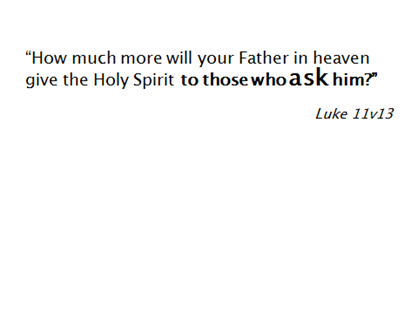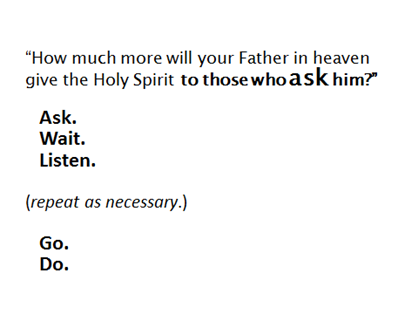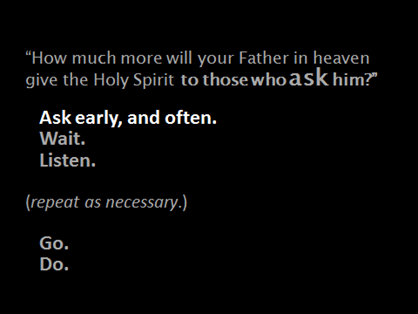sermon notes from the Vineyard Church of Milan 05/18/2014
video available at www.sundaystreams.com/go/MilanVineyard
podcast here: http://feeds.feedburner.com/VineyardChurchOfMilan
or via iTunes here: https://itunes.apple.com/us/podcast/vineyard-church-of-milan/id562567379
[story of Evelyn and the bathroom at Denny’s]
I think we have a longing in common, all of us human beings, whether we are religious or not. And that is a longing to experience love, to participate in love.
And if there is a living God – which I believe there is – a living God who is Love in personal, powerful form, most of us would love to experience communication with him in some way. To have the opportunity to connect with him, if connection is in fact possible. Which again, I’m convinced is in fact possible. For every single one of us. At any particular moment, without any pre-requisites except openness to that kind of connection.
So that’s why we are looking at this particular story in the book of Acts (give brief background)…
[Acts 13:1-12 (watch video here)]
We’ve talked about the Holy Spirit as the breath of God, the animating energy source at the heart of the universe. A Spirit with will, intention, desire, personality, purpose. A person, in other words, not an “it.”
Life after Easter is life which is animated, energized, directed, enlivened by that Spirit.
You and I know what it is to go through the motions. Day after day after day can pass colorlessly, like sand through our fingers. Life can be busy, stressful, anxious, exhausting – and empty. Life without life.
Or, we can have life that is full, abundant, life spilling over. Adventure and intense engagement in one moment, restful joy in another, pain and sorrow, even grief. Rhythm and routine, the spontaneous and the unexpected, love, laughter, failure and frustration mixed together. But always alive, even when it’s hanging on a moment.
The difference between the two, the mysterious ingredient? The Holy Spirit of the living God.
Of course, today, Life after Easter – the resurrection of Jesus - the Spirit of God is everywhere, all the time, available to everyone, but as we talked about last week, the question for us is our awareness and responsiveness.
So perhaps it would be better to say the difference between Alive / Life after Easter and every other kind of life is the difference between being awake to the Holy Spirit’s presence, and being asleep. The difference between responding to the Spirit and ignoring the Spirit.
[small group conversation / prayer / walk home experience]
Let me tell you a story a man I know told me recently.
[Nathan’s vision about the two boats…and the impact on his life]
Notice, we’re not talking about the difference between successful lives and unsuccessful lives. We’re not talking about the difference between effectiveness and ineffectiveness, accomplishment and failure.
Life in the high performance speedboat might be successful, effective, accomplished. It’s noisy and busy and cool looking. But it’s not really living. When you wake up from it, you realize you’ve been unaware of the beauty and joy around you. And that there is a completely different kind of engine and experience available.
At the end of the day, it’s the difference between living in love and living in fear. Love is one kind of engine, fear another kind entirely. Both can power your boat, but only one gives you joy.
[note that perhaps if the Holy Spirit were giving you a vision, it might be reversed – you lounging on the deck of an aimless cruise ship, bored out of your mind, Jesus inviting you to get on his speedboat, because that’s where you’ll really be alive. The point is one has joy and life, the other misses out on both]
Let’s return now to the Acts 13 passage we opened with.
25When Barnabas and Saul had finished their mission, they returned from Jerusalem, taking with them John, also called Mark. 13 1Now in the church at Antioch there were prophets and teachers: Barnabas, Simeon called Niger, Lucius of Cyrene, Manaen (who had been brought up with Herod the tetrarch) and Saul. 2While they were worshiping the Lord and fasting, the Holy Spirit said, “Set apart for me Barnabas and Saul for the work to which I have called them.” 3So after they had fasted and prayed, they placed their hands on them and sent them off.
4The two of them, sent on their way by the Holy Spirit, went down to Seleucia and sailed from there to Cyprus. 5When they arrived at Salamis, they proclaimed the word of God in the Jewish synagogues. John was with them as their helper.
6They traveled through the whole island until they came to Paphos. There they met a Jewish sorcerer and false prophet named Bar-Jesus, 7who was an attendant of the proconsul, Sergius Paulus. The proconsul, an intelligent man, sent for Barnabas and Saul because he wanted to hear the word of God. 8But Elymas the sorcerer (for that is what his name means) opposed them and tried to turn the proconsul from the faith. 9Then Saul, who was also called Paul, filled with the Holy Spirit, looked straight at Elymas and said, 10“You are a child of the devil and an enemy of everything that is right! You are full of all kinds of deceit and trickery. Will you never stop perverting the right ways of the Lord? 11Now the hand of the Lord is against you. You are going to be blind for a time, not even able to see the light of the sun.”
Immediately mist and darkness came over him, and he groped about, seeking someone to lead him by the hand. 12When the proconsul saw what had happened, he believed, for he was amazed at the teaching about the Lord.
Beautiful and complex interplay going on here if we have eyes to see it…
[the church at Antioch] Ekklesia, meaning called out into a public place to hear the emperor’s edicts / subverted by the community of Jesus to mean those called out into a community to hear the Lord Jesus. Although, of course, with Jesus, the extra twist is that what they experience is much more personal and particular than edicts. They hear a person who knows them, who sees them, who loves them, who desires life for them, leading them and guiding them into joy. In truth they are the ones called out to listen to the Holy Spirit.
[worshipping the Lord] There are a couple of words translated “worship” in Acts. One is proskyneo, which is to bow towards, to kiss – something like what we participate in on a Sunday morning in song, or perhaps on a hike when we try to connect with God through the beauty of nature, for example. But here the word is Leitourgeo: originally referring to service to the state, at one’s own cost. What we might call today, positively, “public service.” The people’s work.
Of course, here in Acts, the context is a contrast between two kinds of experiences of authority – Caesar as Lord vs. Jesus as Lord. Under Caesar, in an outpost of the Roman Empire, we can imagine leiturgeo wasn’t so positive; more like the functional slavery of the oppressed. That’s not what the “people’s work” in Acts is all about. The work of Jesus’ people is very, very different.
What is the work Jesus’ people do, at their own cost?
In the relationship between people and the God revealed in Jesus and the scriptures, we aren’t the workers, God is. Our work is the work of asking, waiting, depending, receiving. This is a great arrangement, isn’t it? Bring on the leitourgeo!
We can imagine this probably meant for these people that they were praying. Talking to God about what they needed, praising and thanking him for provision, waiting for him to respond, listening for his voice.
And, they were…
[fasting] – a spiritual practice of not eating, for the purpose of putting oneself in a posture to ask and receive/hear
When Caesar is Lord, and you are one of the conquered, you hope to never hear from him. You hope he just leaves you alone. But when Jesus is Lord, you’re devouring his every word, because each one leads you to life and joy. Caesar’s ekklesia is a community ruled by and energized by fear, but Jesus ekklesia is community ruled and energized by love.
So front and center in this story there is Authority. The authority of the Lord after Easter, Jesus the crucified and risen king.
There is voluntary submission or giving oneself to that authority on the part of his ekklesia.
There is the ekklesia asking that authority for input / direction – slaves whom the master has freed and made into friends, telling them everything about his business.
The community of submitted friends who’ve given themselves in devotion to the good King are asked to set apart a couple of its leaders to the King’s purposes.
There is an invitation or call to those leaders.
The community asks for more help discerning, gives blessing, releases the leaders
The leaders follow the leading or calling of the Holy Spirit, who sends and directs them
It’s incredibly free and dynamic, interdependent.
And it’s all ruled by Love. Love that invites us to joy. Love that inspires us to submit in obedience and trust. Love that releases without fear. Love that moves out of comfort into the unknown with courage and confidence.
Then, this free and dynamic, ruled-by-love system – what the new testament calls “the kingdom of God” – moves across the ocean and lands in Cyrprus, where it encounters these two characters.
There is a proconsul summoning / inviting and seeking who wants to hear…
Who in the end gives himself to the good authority of Jesus, joining in the free, dynamic, ruled-by-love system.
And, in contrast
There is a false prophet (a manipulator), opposing… Resisting…
Who in the end we see wandering around blind, looking for help knowing what direction to go
To recap…
There is life ruled by a good God, revealed in Jesus, who longs for human beings to experience life, to experience joy in life-giving, personal relationship with him. This good God providing for them in love, freeing them from fear of every sort so they can love one another and be brought into loving community with each other, growing in confidence in his loving provision for them.
And there is life under the Roman Emperor. Someone with his own motivations to get the most he can from his citizens, usually through force and manipulation, ruling through fear, his most benevolent seeming acts only a disguise for hidden exploitative agendas. Which of course is a picture of all of human life under the influence of the enemy of life. It’s a form of slavery dressed in the clothes of freedom.
Now that Jesus is risen from the dead, all of us are in the position of the proconsul – under the employ of the emperor, but free to choose a new Lord, a new way of life.
That life is only possible with the Holy Spirit and an obedience born in freedom and love.
The other life – the life we are all too familiar with - always exists everywhere there is the absence of the awareness of the Holy Spirit and an absence of obedience to the Holy Spirit born in freedom and love.
One life is like is a joyful dance.
The other is like a chain gang.
The chain gang is ruled by whips, where the dance is ruled by music. Music is a very different kind of authority from a whip. You throw yourself into the music, love the music, welcome the music into your very being. Good music frees you to become who you truly are as it shapes and calls out of you the whole new you whom you only discover in relationship with its rhythm and melody and harmonies.
Like a dance, joyful lives in the community of Jesus led by the Holy Spirit are characterized by a rhythm of purposeful stillness and directed motion. (ask, wait, listen/receive) + (go, do) Each pause shapes the next going and each going gives way to the next pause.
The Lord’s agenda for us, and for the world that’s been put under his authority, is life in all its fullness.
Every sending on the way is for that purpose.
Even the sendings that look like a sending to the cross.
Joy is set before us. Always. Always.
We’re driving speedboats but invited onto the Love Boat – a boat with a different kind of engine, belonging not to us, but to Jesus.
Which do you choose?
Practical Suggestions:
1. Announce your availability to be sent. Try a prayer like this: Holy Spirit, my life belongs to you, for your purposes for me and for the world. So send me wherever you want today. Tomorrow. And every next day after that.
2. Try 1 Hour of Going. Skip 1 hour of television to make a call or write a card or take a walk directed by the Holy Spirit. Take the first 5 minutes asking “to whom” or “to where” and take your best shot at following whatever instructions you become aware of. Don’t worry at this point what you actually say or write or do; let that happen naturally.
Note: you can try this whether or not you are a Jesus follower yet. The Holy Spirit is everywhere, for everyone, all the time. This is part of the reality of life after Easter. So give it a shot, see what happens.

